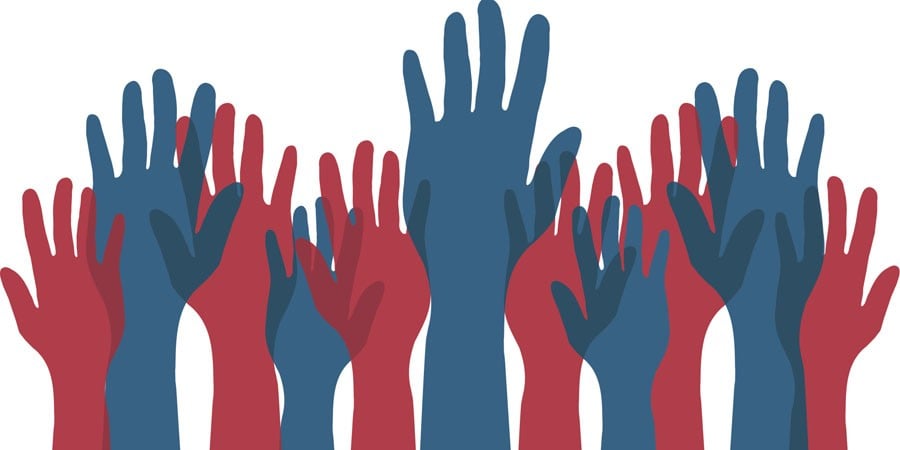
Democracy as a system of governance remains a challenging and unattainable ideal

Language enables humans to engage in communicative inter-exchange to make sense of their lived experience. It’s a fact that words give meaning to abstract thoughts while converting certain ideals to intelligible concepts. The words we use in our daily communicative exchanges enable us to articulate our existence.
Philosopher Ludwig Wittgenstein argued, "To make sense of their lived experience, humans engage in language games made possible through pictural references." Wittgenstein asserted, "Every linguistic design is fundamentally an elaboration of our visual experience." He believed words triggers meaning-making and convey a certain connotation only because they complement our ability to sight.
In contrast to pictural referencing under language design, etymology is a study of sources and development of words. Etymology is an antonym of colloquialism and counteracts visual description. Colloquialism and pictural reference never reflect the true meaning of word’s origin. Colloquialism is not the true reflection of an original construction of the concept.
Our ability to sight may remain constant, but our cognitive abilities evolve through time and we struggle to actualise certain ideals or even make sense of their practice. The reality of empirical world while regenerates meaning-making, it also degenerates originality of concepts. The issue is that process of meaning-making evolves through time and it scythes away the efficacy of the original construct.
In the context of our political existence, one word, rather the one concept that defines our lived experience is the ideal of democracy. What we think of, and visualise democracy to be, is not how it was conceptualised in the beginning of its origin.
The genealogy of democracy traces its origins in Ancient Athens. The concept of democracy is derived from two Greek words demokratia, the root meanings of which are demos (people) and kratia (rule in the sense of power).
As a form of political system, democracy meant a form of government in which (contrary to monarchies and aristocracies) people ruled. Athenian democracy was revolutionary in a sense that it accorded all citizens (excluding women, slaves, metics i.e., those who were immigrants) democratic equality to participate in government. Novelty of the ideal of democracy meant people themselves participate in making of collective decisions to regulate their community.
Literal meaning of democracy: the people rule or rule of people is controversial even in today’s time as it was when practiced in Ancient age. Philosophers of antiquity such as Socrates and his pupil Plato opposed democracy. They believed ordinary people lacked political acumen to think, argue, deliberate and rule the community. These philosophers saw democracy as a crucially flawed political system; moreover, they viewed democratic and political equality ominous for peace of a political community. They emphasised politicking was the rule of educated few and democracy a misnomer for stability and order.
In antiquity, though the majority of population was ignored to participate; in contemporary period, participation of all, however, is must for a political system to be democratic. But how pervasive and efficacious this principle of political equality is in today’s democratic practice demands scrutiny.
Over time and amidst political and social upheavals the novelty of ideal of democracy has lost its vigour. Moreover, in the process, essence of democracy is compromised. Now democracy has ceased to be a rule of demos. It is not masses who deliberate in agora or in assembly, but their elected representatives. Politicking therefore has been transferred onto the representative that masses elect.
In today’s practice, any polity that declares itself democratic is the one that grants substantive political equality to its members. The principle of political equality is the most crucial; declaring that all members of a political community are equal and that no one bears any distinctive priority over any other. Proverbially, in modern democracies, this principle is reflected in an adage one man, one vote. Henceforth, in contemporary times, political equality transcends social and economic distinctions.
But ironically we associate democracy with disorder, chaos and pillage.
In the present circumstances, democracy does not evoke a system of governance that puts premium on citizens’ participation. In fact, the very idea of participation extends only to quinquenniad event of elections. Furthermore, the word democracy is reduced to be a system of governance of few on the behalf of many.
In the beginning of this discussion, brief reference to the philosophy of Wittgenstein was mentioned. He asserted that words enable us to make pictures of facts; based on this thesis, it can be argued that the pictorial reference of what democracy is has been metamorphosed to a rather dismal and a deranged imagery. Citizens living under the fabled ideal of democracy also have ended up visualising democracy as a system wanting ethical base.
Contemporary practice of this ideal therefore is not a true reflection of its origin.
George Bernard Shaw once commented, "Democracy substitutes election by the incompetent many for appointment by the corrupt few": meaning it is us the many who are incompetent who have elected the corrupt few. Interesting to note is the fact that though in antiquity political thinkers believed masses are the direct source of disorder, the present practice however shows that masses have relegated this task onto their elected leaders. And, these elected few have systemically corrupted this ideal. The question is: who is to blame for the demise of this ideal -- the incompetent many or the corrupt few? It seems masses are culpable for they have paved the path for few to mutilate the ideal.
In our time, the novelty of the concept is reduced to be a quinquenniad spectacle. Demos under democracy are mere numeral aggregates. The current practice of democracy has ruined the originality of this ideal system. Contemporary practice fails the originality of the ideal that is democracy. Democracy as a system of governance remains a challenging and unattainable ideal.